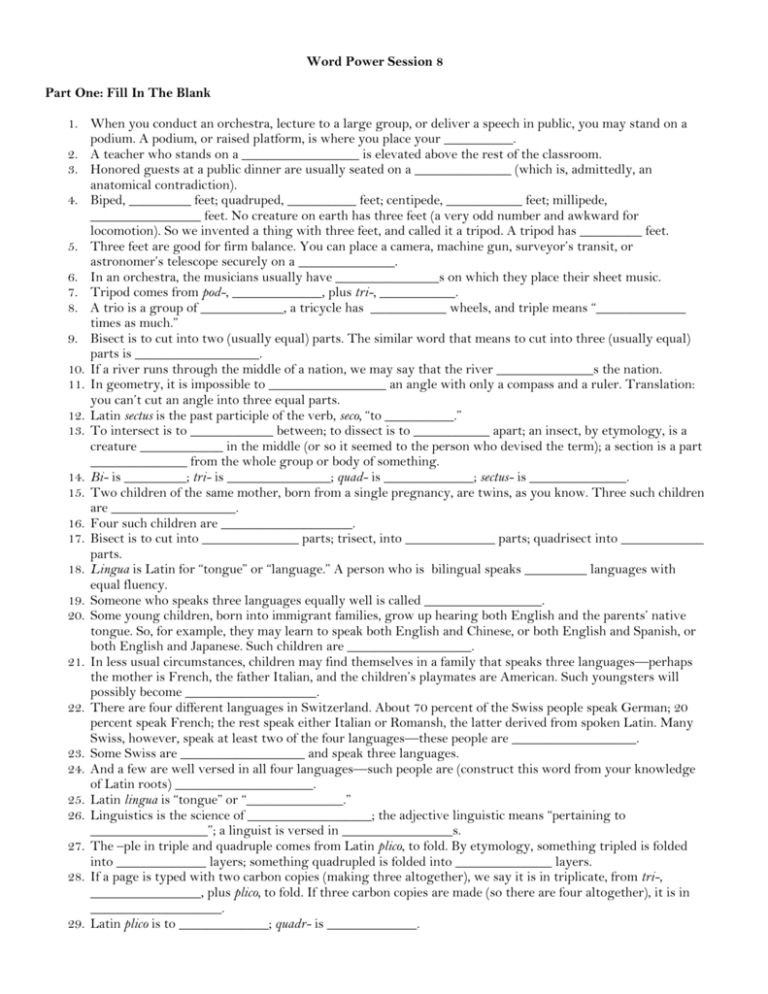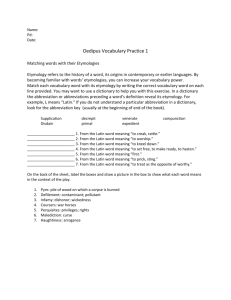File
advertisement

Word Power Session 8 Part One: Fill In The Blank 1. When you conduct an orchestra, lecture to a large group, or deliver a speech in public, you may stand on a podium. A podium, or raised platform, is where you place your __________. 2. A teacher who stands on a _________________ is elevated above the rest of the classroom. 3. Honored guests at a public dinner are usually seated on a ______________ (which is, admittedly, an anatomical contradiction). 4. Biped, _________ feet; quadruped, __________ feet; centipede, ___________ feet; millipede, ________________ feet. No creature on earth has three feet (a very odd number and awkward for locomotion). So we invented a thing with three feet, and called it a tripod. A tripod has _________ feet. 5. Three feet are good for firm balance. You can place a camera, machine gun, surveyor’s transit, or astronomer’s telescope securely on a ______________. 6. In an orchestra, the musicians usually have _______________s on which they place their sheet music. 7. Tripod comes from pod-, _____________, plus tri-, ___________. 8. A trio is a group of ____________, a tricycle has ___________ wheels, and triple means “_____________ times as much.” 9. Bisect is to cut into two (usually equal) parts. The similar word that means to cut into three (usually equal) parts is __________________. 10. If a river runs through the middle of a nation, we may say that the river ______________s the nation. 11. In geometry, it is impossible to _________________ an angle with only a compass and a ruler. Translation: you can’t cut an angle into three equal parts. 12. Latin sectus is the past participle of the verb, seco, “to __________.” 13. To intersect is to ____________ between; to dissect is to ___________ apart; an insect, by etymology, is a creature ____________ in the middle (or so it seemed to the person who devised the term); a section is a part ______________ from the whole group or body of something. 14. Bi- is _________; tri- is _______________; quad- is _____________; sectus- is ______________. 15. Two children of the same mother, born from a single pregnancy, are twins, as you know. Three such children are __________________. 16. Four such children are ___________________. 17. Bisect is to cut into ______________ parts; trisect, into _____________ parts; quadrisect into ____________ parts. 18. Lingua is Latin for “tongue” or “language.” A person who is bilingual speaks _________ languages with equal fluency. 19. Someone who speaks three languages equally well is called _________________. 20. Some young children, born into immigrant families, grow up hearing both English and the parents’ native tongue. So, for example, they may learn to speak both English and Chinese, or both English and Spanish, or both English and Japanese. Such children are __________________. 21. In less usual circumstances, children may find themselves in a family that speaks three languages—perhaps the mother is French, the father Italian, and the children’s playmates are American. Such youngsters will possibly become ___________________. 22. There are four different languages in Switzerland. About 70 percent of the Swiss people speak German; 20 percent speak French; the rest speak either Italian or Romansh, the latter derived from spoken Latin. Many Swiss, however, speak at least two of the four languages—these people are __________________. 23. Some Swiss are __________________ and speak three languages. 24. And a few are well versed in all four languages—such people are (construct this word from your knowledge of Latin roots) ____________________. 25. Latin lingua is “tongue” or “______________.” 26. Linguistics is the science of __________________; the adjective linguistic means “pertaining to _________________”; a linguist is versed in ________________s. 27. The –ple in triple and quadruple comes from Latin plico, to fold. By etymology, something tripled is folded into _____________ layers; something quadrupled is folded into ______________ layers. 28. If a page is typed with two carbon copies (making three altogether), we say it is in triplicate, from tri-, ________________, plus plico, to fold. If three carbon copies are made (so there are four altogether), it is in ___________________. 29. Latin plico is to _____________; quadr- is _____________. 30. By etymology, imply, from im-, ___________, plus plico, is to ______________ a meaning into or within what you are saying. 31. The English word ply, as in plywood, plus four-ply tires, etc., come from plico, to _____________. Plywood is built up in layers, or ______________s; four-ply tires have four layers, or _____________s of rubber. 32. When you imply, you do not say something directly, but only hint at it; your true meaning is, etymologically, __________ed into your words. 33. When you say that a man would never win a prize for honesty, you do not directly say that he is dishonest— you merely ____________ it. 34. A woman says to her lover: “Are you ____________ing that I am too old for you?” Translation: “Are you only hinting, in your usual indirect way, that I’m too old? Haven’t you got the courage to come right out and say it, you miserable coward!” 35. Apply also comes from plico. The ap- is from Latin ad-, to or toward, the d changing to a p for easier pronunciation. By etymology, when you apply yourself, you fold yourself ______________ something. 36. The noun form of apply is _______________________. 37. So, by analogy, the noun form of imply is ___________________. 38. When you say, “What ___________________ are you making?” your statement can be translated: “What meaning are you folding inside your words?” 39. Latin plico, found in English as –ple, -ply, or plic-, is to _______________; ad- is to or _______________; imis ________________. 40. An implicit meaning is _________ed within a statement, rather than directly expressed. 41. “There is an ________________ point here that we must not ignore,” can be translated as: “There is a point folded inside here that we must not ignore.” 42. “Although you’re not actually saying that you disapprove, I hear a lot of _______________ disapproval in your words.” 43. “She has not actually asked him to marry her, but much of her talk strikes him as an _______________ proposal.” 44. Im- is _______________; ex- is __________________. 45. If implicit describes something folded inside, what word describes something folded out, i.e., clearly and directly expressed? (Your knowledge of prefixes will help you construct the word.) ____________________. 46. An _________________ statement is clear, definite, with nothing implied beyond what is directly expressed. 47. “Be more _________________” translates as: “Say directly and precisely what you mean.” 48. Parents should tell their children __________________ly what limits are being set, for then the children know exactly what is expected of them. 49. “Considering the _______________ directions I wrote out for you, how could you possibly have gotten lost?” 50. Podium is built on Greek pod-, ____________________. 51. Tripod is built on tri-, ______________, plus pod-, _________________. 52. Bisect is built on bi-, plus sectus, to ________________; trisect on tri-, _______________, plus sectus; quadrisect on quadr-, ____________, plus sectus. 53. Bilingual is built on bi-, ___________, plus lingua, ____________; trilingual on tri-, ____________, plus lingua; quadrilingual on quadr-, ________________, plus lingua. 54. Triplicate is built on tri-, ______________, plus plico, to __________; explicit on ex-, _____________, plus plico. 55. Imply and implicit are built on im-, ________________, plus plico, to ___________; explicit on ex-, ____________, plus plico. Part Two: Think With The Words 1. She speaks French and German as well as her native language. She is t_________________. 2. Do you mean to i_______________ that I lied to you? 3. Raise the t________________; the camera is too low. 4. When you name is called, come to the p__________________ for your award. 5. Have you ever tried to t____________________ an angle? 6. Make all requisitions in t___________________, one for each of the three purchasing agents. 7. Write all memos in q____________________, one for yourself, and one for each of the branch offices. 8. He b___________________ed the pie into two equal parts. 9. Give e______________ instructions to the class, so every student will know exactly what you want. 10. I am offended at your i_______________________ that I cheated on you. 11. 12. 13. 14. Can you draw two lines that will q_______________________ a circle? Many children of immigrants group up b____________________. Though you won’t directly say yes, I hear i__________________ acceptance in your words. He speaks Swedish, Russian, Romanian, and Swahili—he is, to put it in a single word, q_______________________.







